Dogs have DNA – essentially a genetic “code” – just like humans, turnips, and every other living thing.
This genetic code is organized in thread-like units called chromosomes. While tiny, each chromosome contains a plethora of individual genes that make your pup unique.
With the recent rise in at-home doggy DNA tests, pup parents are chatting about these genetic buzzwords more often, and keeping track of them all can get a little confusing.
Below, we’ll explain dog DNA and canine chromosomes, including the number of chromosomes that dogs have. We’ll also talk about how you can have your dog’s DNA analyzed and what sorts of things you can learn from these tests.
Key Takeaways: How Many Chromosomes Do Dogs Have?
- Chromosomes are little bundles of DNA that contain your dog’s genetic “code.” Each chromosome contains a number of genes, which influence everything from eye color to body size.
- Dogs have 78 chromosomes, which are organized into 39 pairs. This is true for all dog breeds, as well as a number of canine cousins, including coyotes, wolves, dingoes, and jackals.
- You can purchase and complete a dog DNA test to learn more about your pet. This can be especially helpful for determining the ancestry of mixed-breed dogs.
How Many Chromosomes Do Dogs Have?
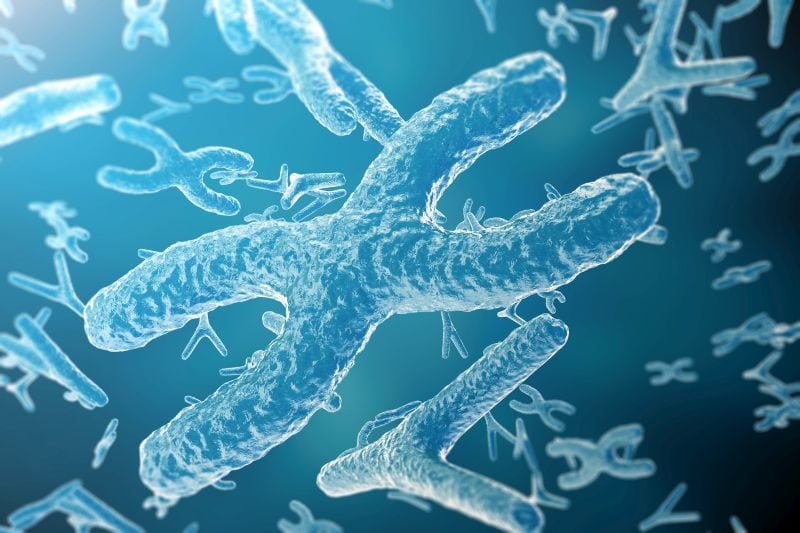
Chromosomes exist within a living organism’s cells.
All dog breeds have 78 chromosomes arranged in 39 pairs. Yes, even the mightiest mastiffs share the same amount as tiny Chihuahuas.
Other canid species have the same amount, too, including coyotes, dingoes, wolves, and jackals.
By contrast, humans have 46 total chromosomes, cats have 38, and the doggo nemesis, the eastern grey squirrel, has 40 chromosomes.
While the examples above are within a relatively small range, the world is full of chromosomal extremes.
A plant called the adder’s tongue fern has a staggering 1,440 chromosomes, while the nematode Ascaris megalocephala univalens has just two chromosomes.

Chromosomes can also vary significantly, regardless of the organism’s size, as seen in the blue whale with 44 total and the petite blueberry with 12.
Having more or fewer chromosomes than another doesn’t mean anything negative or positive about the organism. It’s just the way an organism’s genetic information is stored.
What Are Chromosomes, DNA, and Genes? What Do They Do?
Dog genetics are fascinating, but the topic can get complicated with lots of moving parts to digest. They all fit together nicely, however, so let’s get to know the basics to understand the subject better.
Chromosomes
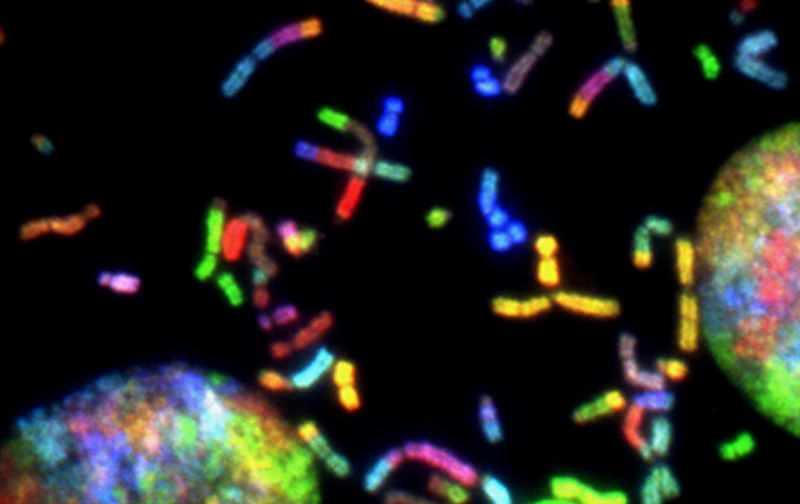
First up are the organizers of all this chaos: chromosomes.
Chromosomes are found in a cell’s nucleus (center), and each chromosome contains protein and a single molecule of DNA. Organisms that have their chromosomes arranged in pairs are called diploid. Humans and dogs fall into this category.
Like us, dogs receive half of their chromosomes from their mothers and the other half from their fathers.
In addition to sorting genetic data, chromosomes often determine an organism’s sex (though this is not universal – some organisms are asexual and others have their sex determined by environmental factors, such as egg incubation temperature).
In mammals, males have X and Y chromosomes, while females have two X chromosomes.
Living things can also have an extra chromosome or be missing one if they separate unevenly during creation. The effects vary by organism, but in dogs, chromosomal abnormalities can lead to health conditions.
DNA
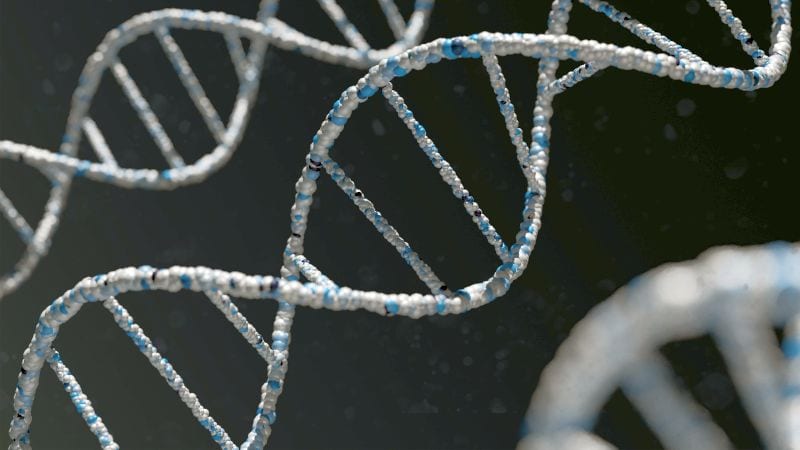
Deoxyribonucleic acid, or DNA, is found within chromosomes and contains the genetic information that details an organism’s growth, reproduction, and much more.
DNA features four bases known as nucleotides, including adenine (A), cytosine (C), guanine (G), and thymine (T). The arrangement of these nucleotides determines your dog’s genetic code.
DNA is unique to your dog but may be shared with an identical twin. That said, identical twins are exceedingly rare in dogs, with most littermates beingfraternal twins, as they come from the fertilization of separate eggs within the mama dog.
And sometimes, littermates may be half-siblings, as multiple male dogs can father a litter.
Genes
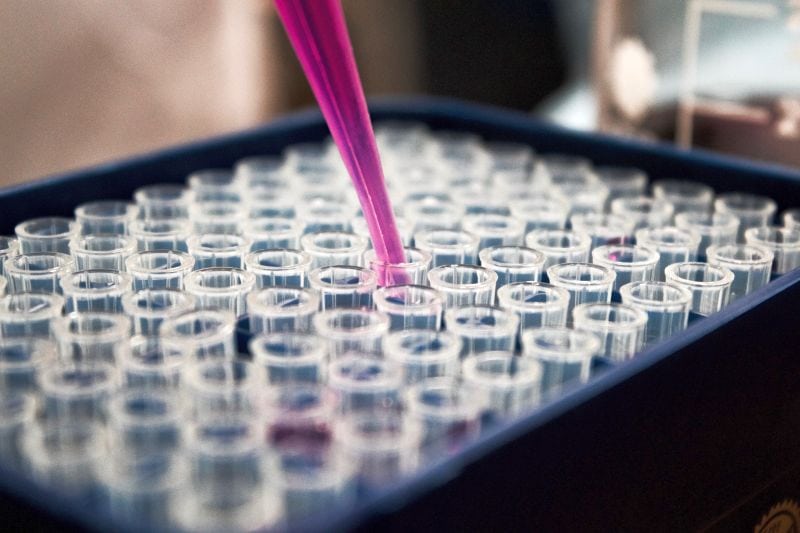
Genes are small parts of your dog’s DNA, which give him the characteristics that make him unique.
This is the blueprint of your dog, including his coat coloring, eye color, personality traits, and any inherited health issues. This is also where your dog’s breed information is located.
If this sounds like a lot of information, it’s because it is; hundreds of thousands of genes are found in each chromosome.
How Does a Dog DNA Test Work?
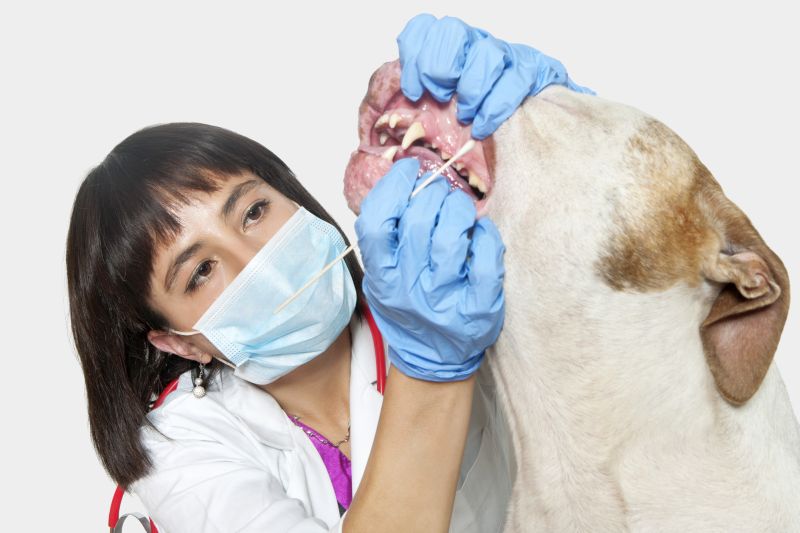
Dog DNA tests have revolutionized what we know about our four-footed friends.
Our pups remained a mystery in the past unless we knew their parents, grandparents, and more. Even then, we’d just have a broad overview. Now, you can figure out the specific breeds behind your pup and so much more, whether he’s a mystery mutt,r a labeled mixed breed like a cockapoo, or even a purebred doggo.
Dog DNA tests are straightforward and usually require the same process. Costs, however, vary and range between $70 and $200.
To complete the test:
- Swab your dog’s cheek with the provided device to acquire a DNA sample. This doesn’t hurt your pup, though it can be tricky with a wiggly puppy, so you might want a helper to hold your doggo while you collect the sample.
- Seal the sample in the provided packaging. Follow all handling guidelines to prevent contamination.
- Mail the package to the lab. This is the hard part, as you have to wait 2 to 3 weeks for results. Ask friends and families to guess your pup’s breed if you have a mystery mutt to pass the time.
- Receive results. Most labs have an ancestry result ready within 2 to 3 weeks that details your dog’s genealogy, including his breed(s) and even siblings if they’ve completed a test too with some companies.
See our full Embark Breed Identification Kit review to learn more about a specific DNA test that’ll tell you a ton about your dog!
What Can Genes, Chromosomes, and DNA Tell Us About Our Dogs?

Getting your dog’s genetic makeup may seem unnecessary, but it’s handy for many reasons and downright essential in some instances. It’s also interesting to dig into if you have a mystery canine on your couch.
Knowing your dog’s genetics helps with the following:
- Breeding: Good dog breeders know the genes of their breeding stock. Not only is this critical in preventing the breeding of related dogs or those with a hereditary disease but also in avoiding dangerous double-merle pairings seen in merle and harlequin dog breeds.
- Understanding behavior quirks: Having a mixed breed sometimes means discovering unusual behaviors in your dog when you least expect it, such as herding other animals and kids or “pointing” at random objects. Knowing the breeds within your bestest boy can explain some of these unique behaviors and help with training and picking extracurricular canine activities like swimming, Schutzhund, and more.
- Identifying potential health concerns: Knowing your dog’s breed background highlights any potential health problems linked to his lineage, such as medication sensitivities in collies or heart issues in Cavaliers. Some even identify genetic variants that may mean your dog is at an increased risk of a condition. Don’t panic; this doesn’t mean your dog will have these issues. The knowledge just gives you a list of things to look out for. You may even be able to better protect your dog’s health with preventative measures with your vet.
- Predicting size: Having a mystery puppy can leave you a little lost over his full adult size. Knowing your pup’s lineage helps determine roughly how large he’ll be as an adult, which aids in everything from deciding the kind of puppy food he’s eating to how much he should eventually weigh. This is critical if you have a large breed puppy, as their nutritional needs differ from other pups.
- Providing proof of breed: With breed bans common in some areas and breed misidentification even more prevalent, having your dog’s actual breed lineage on hand is a great idea. This is especially important if your pup has a blockier head or stocky build that’s often confused with pit bulls and other bully breeds frequently targeted by restrictions. It’s also a good idea for husky-like breeds that may be incorrectly labeled hybrid dog breeds.
- Learning traits: Some dog DNA tests test for physical characteristics, including coat color and shedding. This can help with future grooming, particularly if you have a puppy whose adult coat texture and shedding are currently a mystery.
- Knowing your dog’s genetic age: Rescued pups’ ages are usually a rough guess by shelters, especially for adults. Some DNA testing companies gauge a dog’s genetic age during testing, which can help you select the best food for your dog’s age, particularly if he’s getting a little gray in the muzzle.
- Discovering relatives: This varies by company, but some offer insight into your dog’s genetic relatives. This isn’t just fun for connecting for pup playdates but for comparing health notes too. K9 of Mine CEO Megan Marrs found out that her pup Remy has a close relative nearby, so she was able to arrange a meet up!
Dog Chromosome FAQ
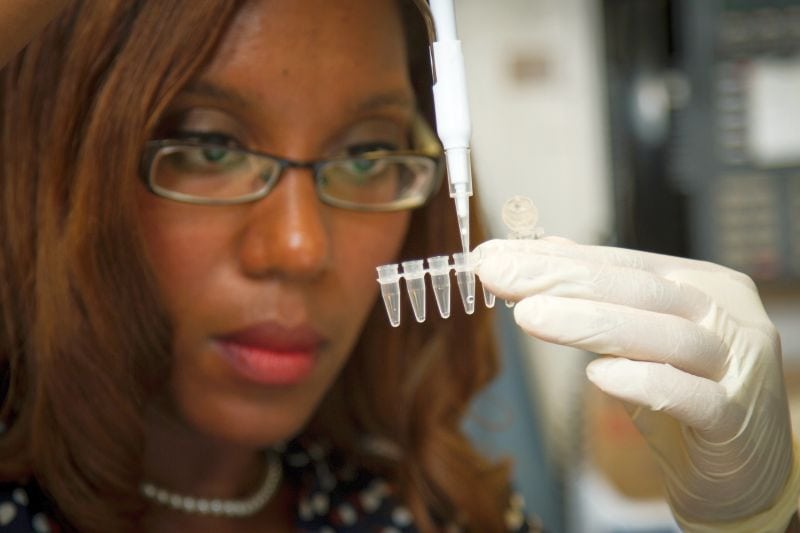
Canine chromosomes and genetics can be tricky to understand, so we’ve wrangled up the most basic questions to paint the clearest picture. Hope we can help!
Why do dogs have 78 pairs of chromosomes?
Dogs have 78 total chromosomes arranged in 39 pairs. Half come from their mother, and half come from their father. One pair determines your dog’s sex, while the other chromosomes hold your dog’s unique genetic plans that determine his size, color, and more.
They have this amount because this is how their genetic information is split. Every living organism has its own predetermined number of chromosomes. In humans, we have 46 total chromosomes divided between 23 pairs.
Do all dog breeds have the same number of chromosomes?
Yes, all domesticated dog breeds (big and small) have the same number of chromosomes: 78. They share this number with several other canid species, including wolves, coyotes, and jackals.
Do dogs have chromosome 21?
Yes, dogs have chromosome 21. This one is commonly watched, as chromosome 21 is connected to Down syndrome in humans. Down syndrome has not been documented in dogs, though they can suffer from chromosomal abnormalities, including on chromosome 21, which mirror the clinical signs of Down syndrome, such as reduced stature and facial irregularities.
How do you know if your dog has an extra chromosome?
The only way to know for sure is to have your dog’s genetics tested by your vet. Clinical signs may call for this testing, including growth delays, facial changes, and eye issues. If you’re concerned, ask your veterinarian.
Dog genetics and chromosomes can be confusing, but if you break them down into bite-size bits, understanding the subjects is much easier.
Have you had your dog’s DNA tested? Did you learn anything cool? Share with us in the comments. We’d love to hear!






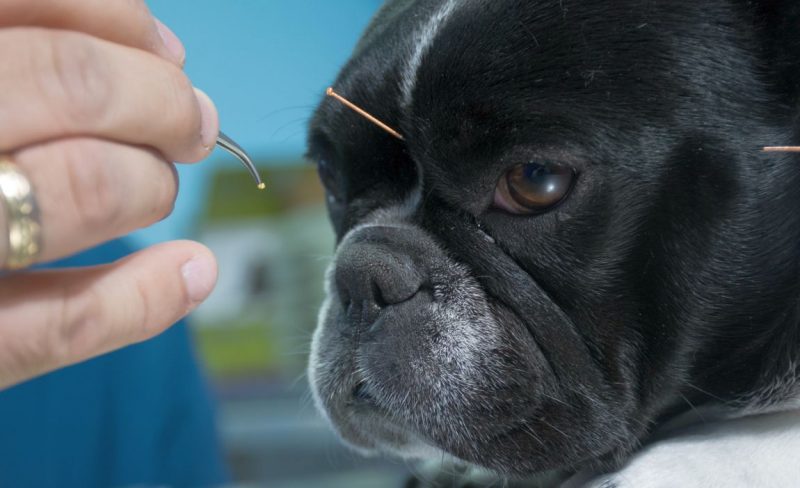
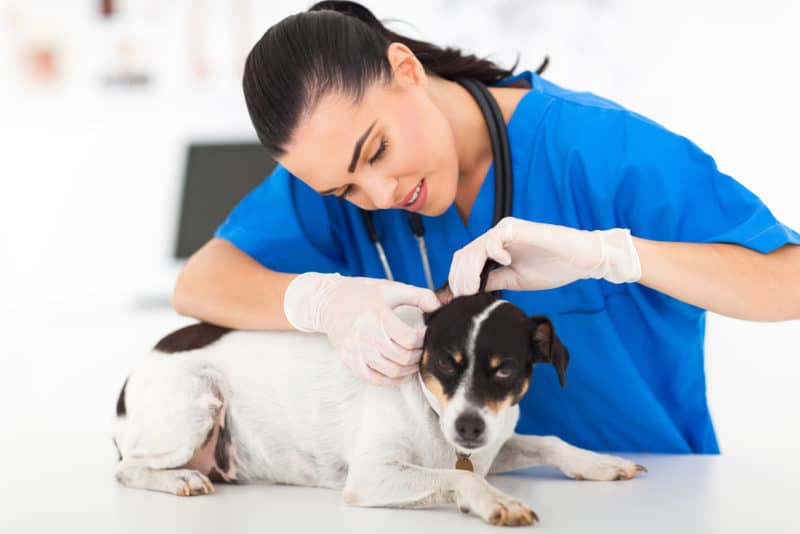
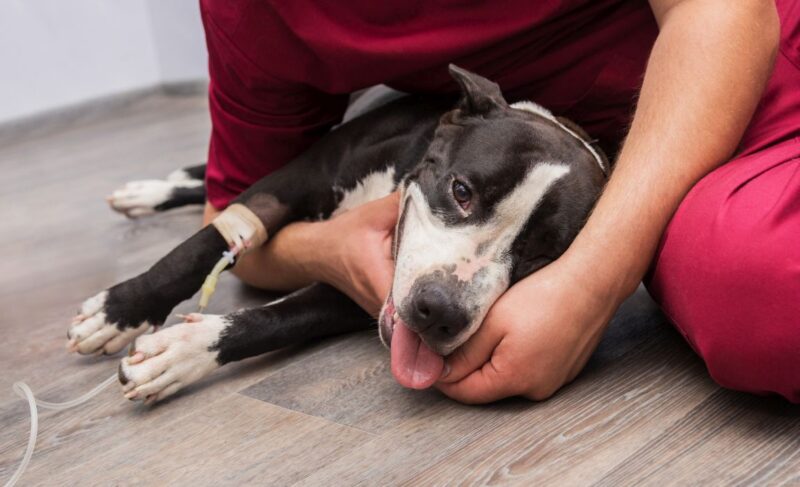
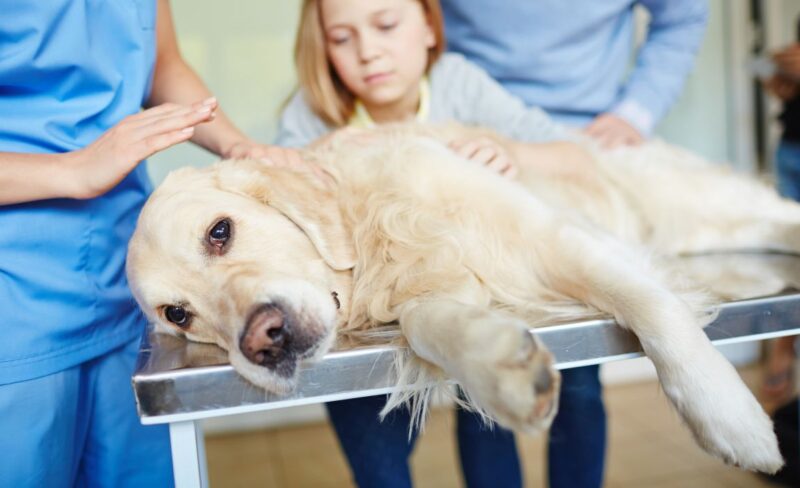
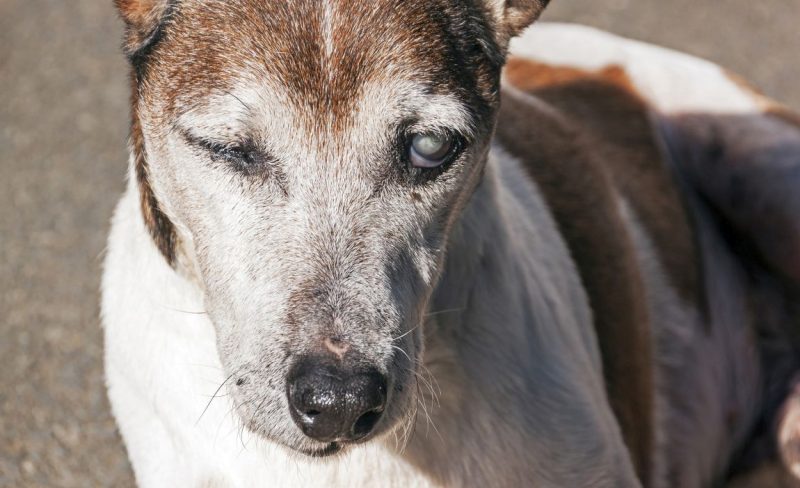
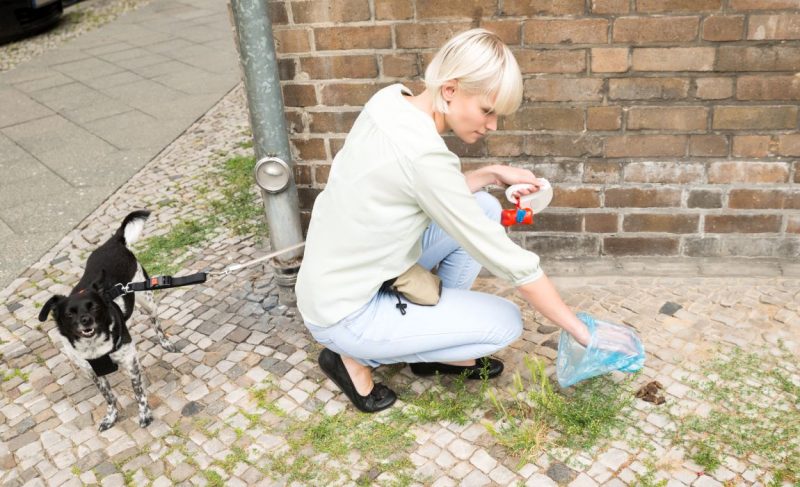

Leave a Comment